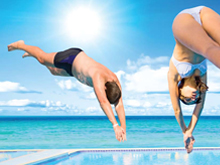 |
Swimming is not only one of the best activities for overall fitness, it also eliminates the discomfort and lethargy that come with most workouts. A long dip could be an energising, refreshing summer workout in summer that is also mentally therapeutic. |
Swimming comes with multiple benefits: water has a low impact on the joints, enhances better blood circulation, strengthens the abdomen (natural core strength training) and lower back – a recurring problem in modern lifestyle.
6 Health Benefits
- Every muscle works out : Swimming involves almost all of your major muscle groups employing the neck, shoulder, chest, back, triceps and biceps, muscles of the upper body, the abdominal, low back, and oblique muscles of the midsection, and the gluteal, quadriceps, hamstrings, and calf muscles of the legs. Whew!
- Low impact on joints and muscles: The buoyancy of water acts as a cushion, eliminating the harsh pounding that comes from exercise on land or machine, that stresses your joints and muscles. In fact, swimming is regarded as one of the safest exercises. With very little risk of injury, swimming is rehabilitative to those who have suffered injury earlier.
- Physical health benefits: Swimming builds flexibility, endurance, muscle strength and cardiovascular health. Water adds 12 times more resistance than air, so it takes more work to move through water than air. Swimming not only helps strengthen muscles, it also helps builds lean, flexible muscles.
- Weight loss: There is some amount of weight loss, but the biggest benefit is complete muscle toning. Ideally one could burn upto three calories a mile per pound of bodyweight. Of course, how many calories you burn depends on how much you weigh and the intensity of your workout.
- Statistics don’t matter: Your age, weight or fitness level, have no relevance to this sport, making it universal - including those who are overweight, pregnant, young or old. Some even start training their children to adapt to water at the age of one!
- Mental benefits: For many swimmers, swimming is like a form of mediation. This is because swimming is a focused activity that cannot be combined with distractions like reading or watching television. Swimming forces you to regulate your breathing, and allows you to focus on nothing but the rhythm of your stroke. It reduces stress and leaves you feel relaxed and refreshed.
Aqua Aerobics
- This has most of the fat-burning and endurance-building benefits that you get from other forms of aerobic activity.
- An aerobic water exercise of around 30 minutes will help you burn about 300 calories.
- Along with warm-ups and stretching exercises, jogging, kicking, jumping, squats, and dance movements are incorporated into the workout.
- Water based aerobics can be customised for all fitness levels and is good for fat burning.
- This is also an excellent cardio-respiratory exercise that builds flexibility and strength.
Aqua Exercise
- These are resistance/strengthening workouts aimed at improving tone, strength and mobility.
- The resistance of the water against the body and because of the cushioning effect that water provides, this form of exercise is particularly beneficial to anyone at risk from bodily stress, including the elderly, overweight, or those recovering from soft tissue injury.
- It’s also particularly good for pregnant women and is an ideal post-natal exercise.
- Increased muscle tone, aerobic endurance and flexibility are visible results of these workouts.
|
|